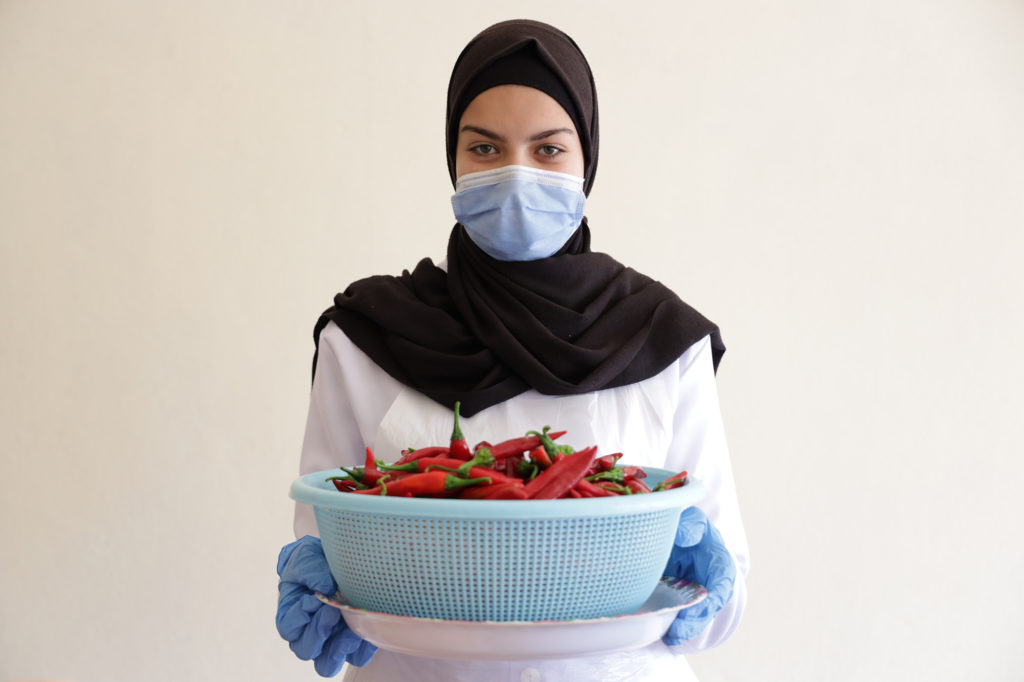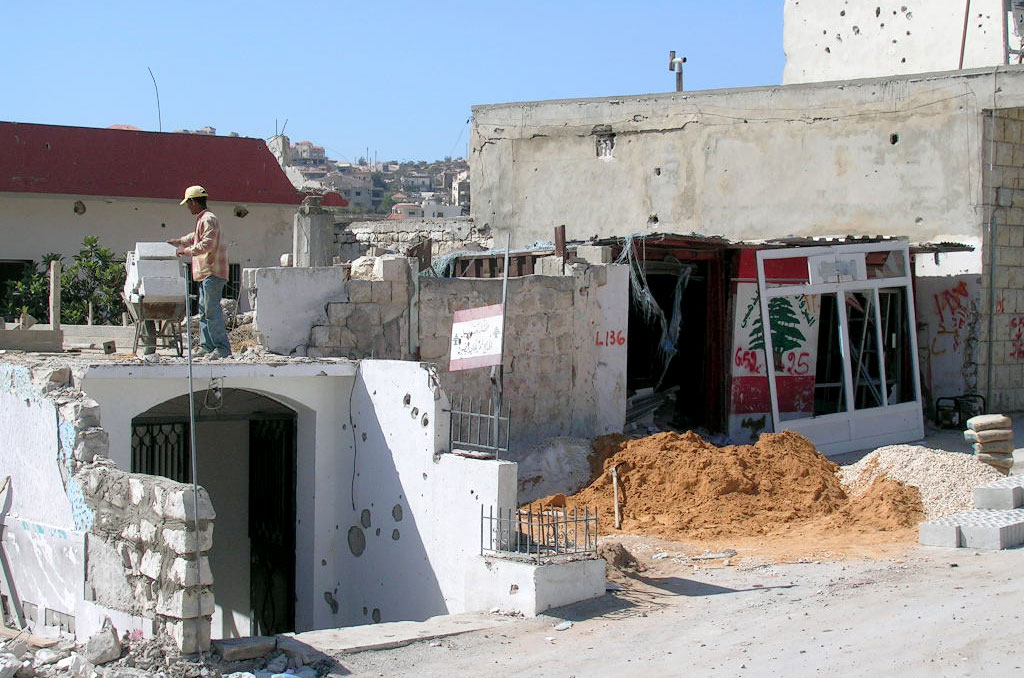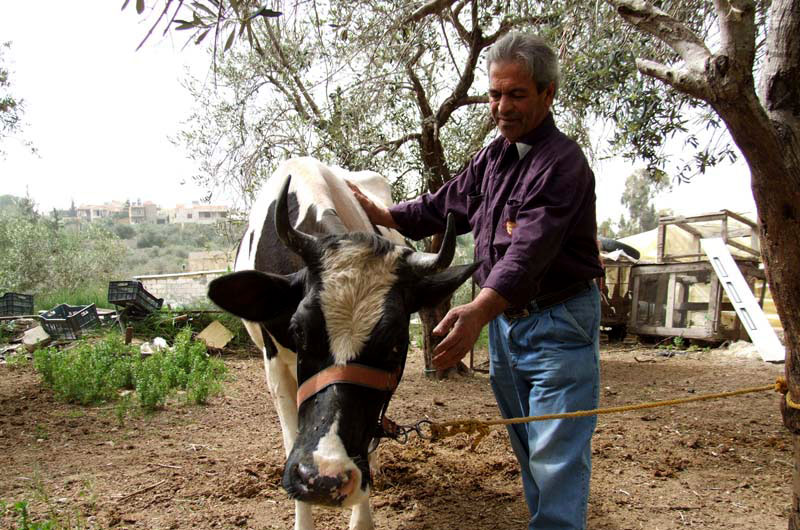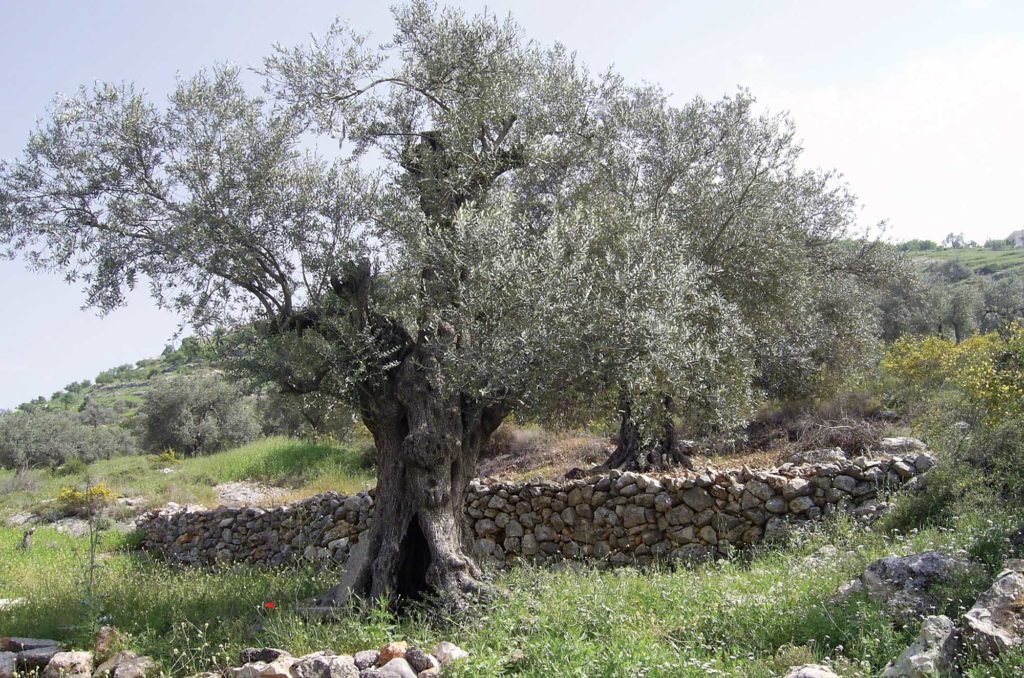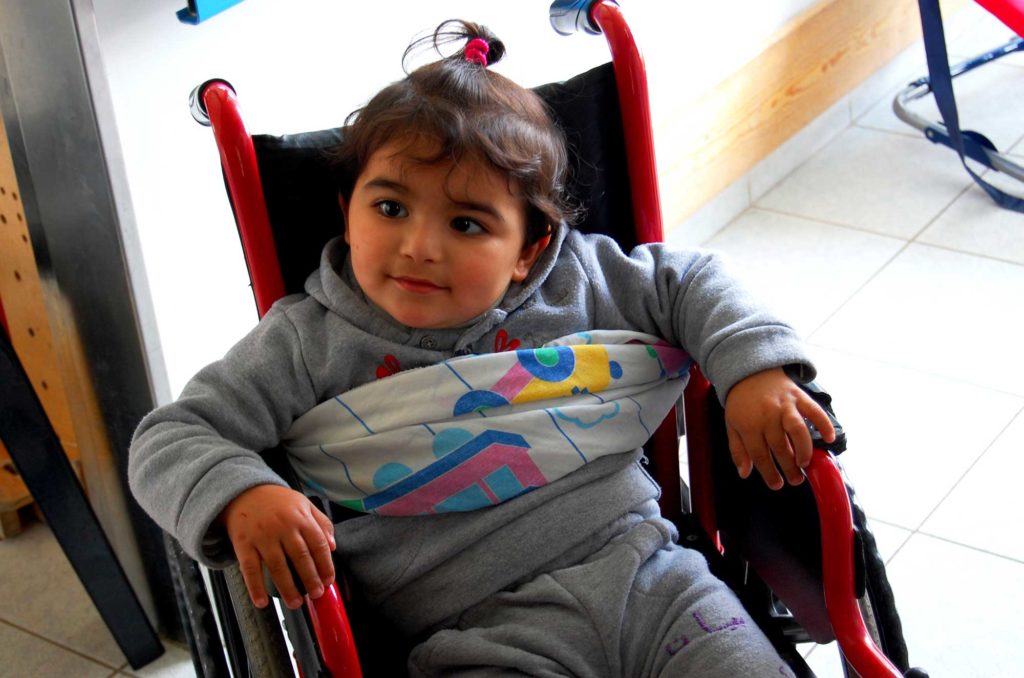Anera in Nabatieh, Lebanon
Jan, 2025
This rural region is the southernmost governorate of Lebanon. The population is mainly Shia Muslim, with a sizable Christian minority. Following the Syrian conflict in 2011, the area has hosted some tented settlements of Syrian refugees.
Nabatieh Governorate | محافظة النبطية
The southernmost governorate of Lebanon, Nabatieh borders Syria and Israel. The population is mainly Shia Muslim, with a sizable Christian population as well. Following the Syrian conflict in 2011, the area has hosted some tented settlements of Syrian refugees. The governorate also once contained the Nabatieh Palestinian Refugee Camp, until it was destroyed in 1974 by Israeli forces.
Olives are a leading crop in this rural and largely agricultural territory. Unemployment and limited availability of jobs is a major issue. The area was greatly impacted by the 2006 conflict with Israel.
Notable landmarks include Beaufort Castle, a Crusader fortress dating back to the twelfth century and once occupied by Saladin, that looks down onto the Litani River. The archeological ruins have been a site of military significance as recently as the 1970s and 1980s, when Palestinian and Israeli forces fought for control of the elevated position.
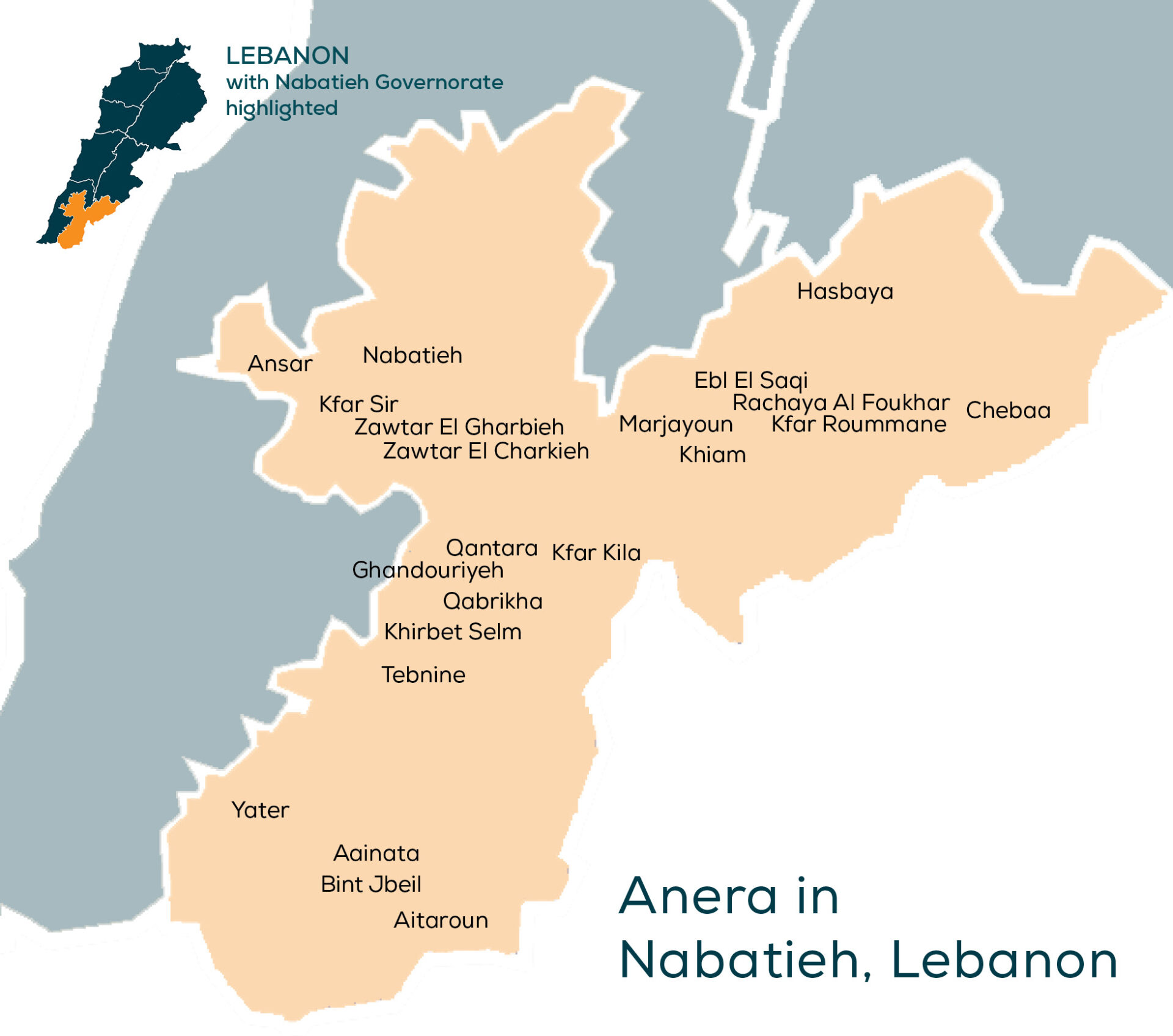

Education
Anera’s youth employment program provides vocational and technical education to help youth gain employment by enhancing their skills. Anera implements this program through local partners, providing vocational courses across much of Lebanon, including the Nabatieh Governorate.
The economic collapse is contributing to an increase in Lebanese youth seeking employment in fields like plumbing, electrical maintenance and construction (an industry that was previously a mostly Syrian-dominated field). Anera’s nationwide vocational education program is positioned to help youth weather the economic crisis that their country is experiencing. Our courses provide youth with skills-based knowledge, hands-on training and paid internships or other work experience.
2006 War Recovery
In the wake of the 2006 war, Anera carried out a recovery project in southern Lebanon that focused on restoring the capacities of community-based organizations through education and vocational training, marketing and information technology initiatives. We partnered with several local non-profits to reach the most vulnerable communities with vocational training courses and infrastructure upgrades.
Anera equipped and furnished the Tebnine Center, the Ansar IT Center and Kfar Sir Youth Center and rehabilitated the East Zawtar Cultural Center and Kfar Kila Center.
The program’s 32 vocational training courses empowered and educated 424 entrepreneurs in business management, food processing, marketing, hygiene, soil fertility, aromatic plants, construction and more.
Agriculture
In the wake of the 2006 war, Anera focused on rebuilding infrastructure like bridges, culverts, retaining walls, wells, and cooperatives. The aim was to have an immediate impact on the lives of farmers and those who own and work in non-farm businesses in the rural and peri-urban districts in the Nabatieh Governorate. We rehabilitated retaining walls in Khirbet Selm, Aainata, Zawtar El Charkieh, Zawtar El Gharbieh, Yater and Rachaya Al Foukhar; a culvert in Zawtar El Gharbieh; an irrigation pool in Ghandouriyeh; and infrastructure at the Khiam Cooperative, Nabatieh Cooperative and Qabrikha Olive Cooperative.
Anera has addressed the issue of increasing income for farmers in Nabatieh by putting land back into use and improving the quality of the products produced on the farms. In 2010, we developed a program with the Association for the Development of Rural Capacities to provide milk machines to farmers in the Nabatieh area. We provided farmers with the machines and with training in order to improve the quality and quantity of milk. Participating farmers had very small herds and this project helped to increase their income.
Also in 2010, to help farmers struggling to meet the costs of production costs, Anera partnered with the YMCA to support 141 farmers in Deir al Ahmar (in Baalbek-Hermel Governorate) and Hasbaya (in the Nabatieh Governorate) with 6,718 trees, soil testing, and technical assistance. The project increased farmers’ income by putting fallow lands back into use and improving the quality of the products produced on the farms.
Health
In the early 2020s, Anera has been supporting vulnerable chronic disease patients across Lebanon through the CARMAH program. Within the Nabatieh Governorate this assistance has come in the form of medical donations to the Al Rahma Medical Center in Chebaa and the Kfar Roummane Charitable Dispensary.
Anera has also provided chemotherapy medicines to the Nabatieh Public Hospital to ensure that patients have access to the life-saving treatments they need, despite the very difficult economic circumstances facing both patients and healthcare institutions. Anera also provides the hospital and other local healthcare providers with medical supplies like syringes, and with essential medications for dialysis sessions.
Health Education
In the late 2000s and early 2010s, Anera's Creative Health Campaign in Lebanon promoted simple, cost-effective, good health practices to people living in marginalized and impoverished communities. Anera distributed over one million posters, stickers, games, calendars and other printed educational materials, hosted scores of festivals and parades, and galvanized thousands of activists/volunteers to spread the word about health habits. Our themes included breastfeeding, homemade baby foods, home-based oral rehydration solutions, good nutrition and exercise, smoking cessation, and the rational use of medicines. The Creative Health Campaign worked through 120 local partners. In Nabatieh, Anera partnered with the Kamel Yousef Jaber Social and Cultural Center to do outreach in seven villages and towns around the governorate.
Community
From 2005 to 2008, Anera’s DHIAFEE program promoted responsible tourism and stimulated job creation in rural areas of Lebanon. In Nabatieh Governorate, DHIAFEE supported the Dana Hotel and the Ebl Es-Saqi Guesthouse in Ebl El Saqi, and the SOIL Association Guesthouse in Hasbaya.
2006 War Recovery
Anera launched the Southern Agricultural and Business Recovery (SABR) program in September 2006 in response to the urgent need to rebuild the affected communities and restore the livelihoods of people in southern Lebanon who were affected by the war between Hezbollah and Israel. The conflict severely damaged civilian infrastructure, and caused billions of dollars in economic losses. Many who fled their homes during the conflict returned to find their businesses completely destroyed. Over 900 businesses and some 30,000 homes and shops were destroyed during the conflict. Even before the war, the second highest national percentage of households living in very low economic conditions and rates of people living in extreme poverty was located in southern areas like the Bint-Jbeil district.
Anera focused on families and communities from Bint Jbeil in Nabatieh and Tyre in South Governorate.
Heavy contamination of unexploded ordnance like cluster bombs slowed the process of recovery considerably. The danger made it impossible for many farmers to access their fields.
Anera’s team conducted field visits and damage surveys and rapid needs assessments to identify the priority needs of the people who returned to their communities in the areas of Bint Jbeil (and Tyre). They worked with the Litani Water Authority to identify critical small, community infrastructure needs that directly impact agricultural and economic livelihood activities in the southern communities.
Anera’s objective was to fill the gap in reconstruction efforts by restoring critical small infrastructure that was not being addressed by other organizations and that would have an immediate impact on economic recovery. Our small infrastructure restorations maximized impact by providing comprehensive integrated assistance in targeted areas, as opposed to fragmented standalone, sporadic projects. The program had a direct and immediate impact in rural communities that allowed for the long-term sustainable reconstruction of damaged areas and rehabilitation of community services.
Emergency
The 34-day war between Hezbollah and Israel in 2006 brought devastation to southern Lebanon and displaced nearly 1 million civilians. Anera had just recently opened its first permanent office in Lebanon in Beirut. Our staff acted quickly to respond to the crisis, working with partners to deliver essential relief items to thousands of people in need.
Although Anera’s Lebanon team in those early years consisted of only a handful of people, we were able to respond to the emergency needs, to the human needs, caused by the fighting and destruction.
Anera leveraged preexisting relationships with local organizations like Al Kafaàt, a Lebanese non-profit that was part of our scholarship and rural tourism programs, to distribute hot meals to more than one thousand Lebanese displaced from southern Lebanon and living temporarily in schools in Beirut and in the mountains east of the city. We also distributed infants’ and women’s hygiene kits to Lebanese living in the schools.
Within days of the ceasefire in August of 2006, the displaced returned to their homes or – if their homes were destroyed – to relatives’ homes in their villages or neighboring villages. With their return, we shifted our geographic focus to these areas in southern Lebanon. We delivered some 35,000 hygiene kits to affected families in the South and Nabatieh governorates. In Nabatieh Governorate, our local partners in the distributions included the Jabr Cultural Center in the city of Nabatieh, and the Family Planning Association in Hasbaya.
Together with our local partner, the Association for the Development of Rural Capacities (ADR), Anera worked in South and Nabatieh governorates to provide small grants to 2,100 individual farmers and small enterprises and 10 active cooperatives who suffered losses in the war. In Nabatieh Governorate, this included the localities of Bint Jbeil, Marjayoun, Hasbaya and Nabatieh. The grants enabled the farmers and businesses to recover and bring their income-generating activities back into operation.
Anera and ADR also trained 400 young people, empowering them with skills they could utilize in their own new enterprises or when they worked for other farmers or businesses.
And Anera also repaired 30 damaged structures – small bridges, culverts, and buildings — across southern Lebanon, including two retaining walls in Khirbet Selm and culverts in Aitaroun. Repair of such infrastructure allowed the area residents to resume their normal lives, economic or otherwise. Overall, we estimate that more than 45,000 people benefitted from Anera’s 2006 recovery programming in southern Lebanon.

